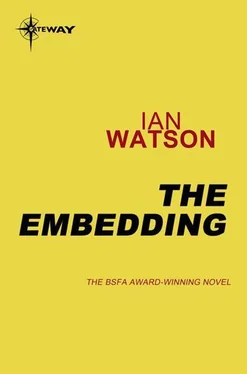Ian Watson - The Embedding
Здесь есть возможность читать онлайн «Ian Watson - The Embedding» весь текст электронной книги совершенно бесплатно (целиком полную версию без сокращений). В некоторых случаях можно слушать аудио, скачать через торрент в формате fb2 и присутствует краткое содержание. Жанр: Фантастика и фэнтези, на английском языке. Описание произведения, (предисловие) а так же отзывы посетителей доступны на портале библиотеки ЛибКат.
- Название:The Embedding
- Автор:
- Жанр:
- Год:неизвестен
- ISBN:нет данных
- Рейтинг книги:4 / 5. Голосов: 1
-
Избранное:Добавить в избранное
- Отзывы:
-
Ваша оценка:
- 80
- 1
- 2
- 3
- 4
- 5
The Embedding: краткое содержание, описание и аннотация
Предлагаем к чтению аннотацию, описание, краткое содержание или предисловие (зависит от того, что написал сам автор книги «The Embedding»). Если вы не нашли необходимую информацию о книге — напишите в комментариях, мы постараемся отыскать её.
The Embedding — читать онлайн бесплатно полную книгу (весь текст) целиком
Ниже представлен текст книги, разбитый по страницам. Система сохранения места последней прочитанной страницы, позволяет с удобством читать онлайн бесплатно книгу «The Embedding», без необходимости каждый раз заново искать на чём Вы остановились. Поставьте закладку, и сможете в любой момент перейти на страницу, на которой закончили чтение.
Интервал:
Закладка:
The experiment was out of control now, and only Rosson was interested.
What to do about it? Withdraw PSF from their diet? When the drug was so obviously producing results?
Vasilki got up next and set off on her own course round the room, helter-skelter.
Then Rama. Then Gulshen.
Soon the four children were running round the room, faces warped with concentration.
Briefly Rosson switched the monitor to the two other environments, hunting for a nurse. But there was nobody on duty in the logic world. Nobody seemed to be on duty in Richard Jannis’s world.
He telephoned the nurses’ standby room upstairs.
“That’s Martinson? Rosson here. Get down to the Embedding World will you? You may have to use the Trankkit. But stay in the airlock till I tell you. I want to watch the crisis develop—”
Then he cut back to Sole’s children. Zoomed in on their snarling, obsessed expressions.
The ellipses they were running wound tighter and more furiously as he looked. He understood the relation between movement and speech in his own logic world. There, the dance of the children was a redundancy strategy—letting language be purified of excess. But here something else was going on. Some different, new relationship between motion and thought. Between the movement areas of the brain and the symbol areas. Were the tensions in the children’s minds discharging themselves out of the symbol world of thought and language, into the world of movement? Or were new symbolic relationships being formed by these mad bursts of activity themselves?
Rosson chewed his fingernail as he thought about the effect of new cross-modal connections forming in the brain…
“Martinson here. I’m in the airlock. They’ve got some pretty vicious expressions on their faces, that lot, Mr Rosson—”
“Yes, well don’t go in yet.”
Suppose PSF speeded up the manufacture of ‘information molecules’ to such an extent that the mind got over-saturated, would the mind be forced to create fresh symbols to carry on functioning? And would these symbols be formed in the action centres of the brain, if the normal symbol areas were already overloaded? Then these would be ‘action-symbols’—symbols that sensed it as their duty to manipulate the outside world directly. The way that magicians used to believe they could, through their spells and magic shapes—their ‘reality symbols’.
The children raced closer to a fearful density of symbolic experience.
Abruptly, they collided. Limbs were mixed up together as madly as a Hindu god’s. Then the four bodies were hurled apart as if by an electric shock.
They fell apart so violently that Gulshen was left lying up against the maze wall with her left leg crumpled under her body at an impossible angle.
“Martinson—get in there! The girl’s smashed her bloody leg!”
FIFTEEN
Ph’theri emerged from the scout ship towards midnight and waited under the sharp desert stars till Sciavoni went out to greet him.
Military police hurried round the building complex alerting Americans and Russians.
The alien stood there looking sad and haunted. But when he spoke, he sounded more impatient and irritable than sad.
“Concerning the trade exchange—”
“Won’t you come inside the building, Ph’theri?”
“It is larger here. I see quite well in the dark.”
“As you like. We have a human corpse on ice—shall we bring it on board your ship?”
“To the ramp will do. Other Sp’thra will take it inside.”
“Can’t we look in your ship then? We’re very curious.”
“Technology is trade-assessable—”
These monotonous economics were beginning to get on Sciavoni’s nerves. He was supposed to believe these creatures were haunted by some kind of thwarted love—like Abelards of outer space, mutilated philosophers hunting for their Heloise in another dimension. Yet they carried on their love affair like spooks or machines.
“The corpse, Ph’theri! How about that? Isn’t that worth a look inside your ship?”
The alien exaggeratedly shook his head, a consciously reconstructed gesture creakily at odds with his anatomy.
“No. Because the corpse is a necessary sub-item of the main trade deal. We have to know in advance the right way to separate brain from body. Are you capable of performing this operation?”
“I guess not. Give us five years—”
“Wait five years? Ridiculous!”
“No, you’ve got me wrong. I don’t mean you’ve got to wait. I mean in five years our doctors ought to be able to maintain the brain in isolation. The psychological problems might be the hardest nut to crack. Tell me this, Ph’theri, what will you do to stop these brains going crazy when they’re cut off? They’re humans—we’ve a right to know.”
“We do not intend to let our property be hurt. The brains will have sensory links with the outside world. The primary difference is, they will no longer be mobiles. But they will not be idle. They have work to do, preparing them for their place in the Language Moon. You worry about their rest and dreaming function? Whatever is necessary for the human brain will be provided. The Sp’thra are used to minds from a thousand cultures of space, water, air and earth, remember. Entertainments? We have many hours of your TV output that can be screened before their eyes—”
“They’ll still have eyes?”
“Eyes usually are an integral part of the brain in the case of hominids. Isn’t that so with you? We shall examine the dead one. Bring it over to the ramp now—”
“Surely, Ph’theri. But I still think a corpse rates a look round your ship.”
“Why can you people not trade-assess correctly? If your culture revered the corpse, as the Xorghil dust-whales do, things would be different. These dust whales are the sentient patterns imposed on the densest dust of a bright nebula, who tow their dying individuals towards a stellar contraction pool where their dead bodies may finally be compacted into a star and reborn as light. They care. But your culture cares nothing for corpses. Witness your entertainments! What is not valued by you, is not trade-assessable. Surely that is obvious?”
Sciavoni called through the crowd of people who had gathered.
“Somebody bring the body out. Up to the foot of the ramp. They’ll take it from there.”
“What’s so obvious about it?” growled a Russian scientist. “So now we are the ones to suffer the fobbing-off with a few shiny beads—like your feathered Indians here in America were traded beads for their precious pelts and skins? As though we are the primitives! Quite a neat dialectical irony. Yet how naturally the spirit of man rebels against such an exploitation, when our dream is of the stars and mastery of nature!”
“It seems other beings have already mastered nature pretty effectively for themselves,” sighed an American voice. “Maybe we ought to be thankful they think enough of us to want our brains. Even if they buy them like apples off a stall.”
“I’ll remind you people,” Sciavoni snapped, “that the price tag for a human brain may still turn out to be a ticket to the stars—”
“Supposing anything materializes out of the Amazon,” grunted the elder astronomer from California.
Ph’theri’s paper-bag ears swelled up to capture the exchange of words.
“How soon till the Brain that Self-Embeds is here?” he demanded.
“Soon, soon,” soothed Sciavoni.
Ph’theri threw up a hand peremptorily. Was it only an illusion—a reflex of their minds—or did the palm actually glow in the dark?
“Now who is being vague?” asked the alien icily.
“For Pete’s sake!”
Sciavoni’s eyes ranged frantically through the crowd for the discreet man from the NSA who was handling liaison with Brazil.
Читать дальшеИнтервал:
Закладка:
Похожие книги на «The Embedding»
Представляем Вашему вниманию похожие книги на «The Embedding» списком для выбора. Мы отобрали схожую по названию и смыслу литературу в надежде предоставить читателям больше вариантов отыскать новые, интересные, ещё непрочитанные произведения.
Обсуждение, отзывы о книге «The Embedding» и просто собственные мнения читателей. Оставьте ваши комментарии, напишите, что Вы думаете о произведении, его смысле или главных героях. Укажите что конкретно понравилось, а что нет, и почему Вы так считаете.












